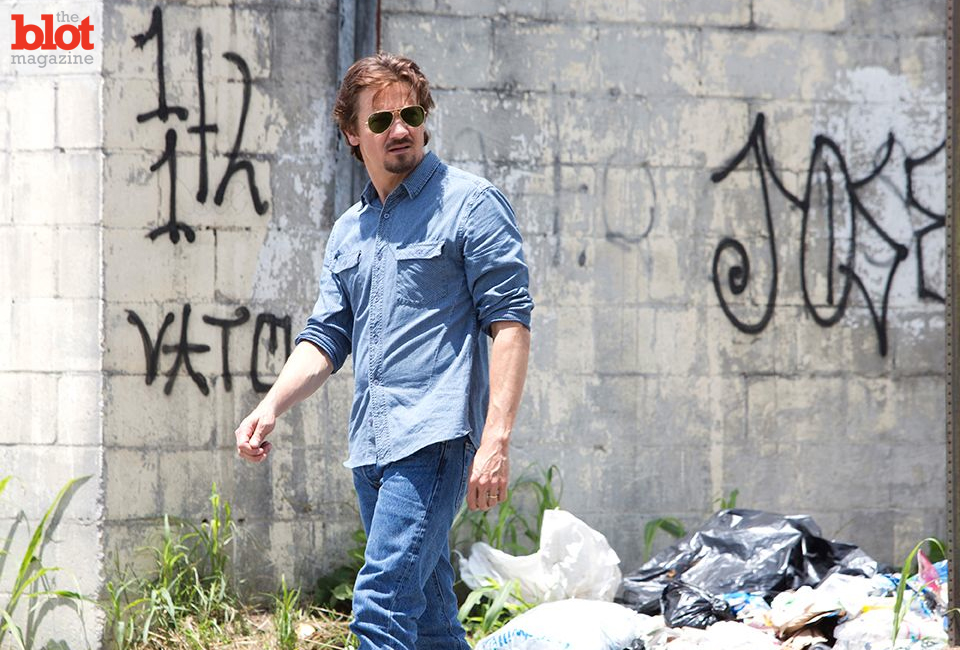“Kill the Messenger” is a thriller based on the true story of Gary Webb (played by Jeremy Renner), a Pulitzer Prize-winning investigative journalist who uncovered the shocking truth that the CIA knew about large amounts of cocaine being smuggled into the U.S. from Nicaragua in the 1980s. They looked away as the crack epidemic ate up the U.S.’s underprivileged neighborhoods. Members of our government knew that the profits of drug sales were facilitating Contra rebels to buy more weapons.
Webb got caught in a web that he couldn’t get out of. In 2004, he was found dead from two bullets to the head. It was supposedly a suicide, and maybe it was, but how the heck do you shoot yourself in the head twice? We’ll never know what really happened, but we do know the CIA tried its best to shut Webb up.
Michael Cuesta directs and Peter Landesman wrote the screenplay adapted from Webb’s book of the same name. The crime biography boasts a talented cast including Andy Garcia, Oliver Platt, Michael K. Williams, Michael Sheen, Tim Blake Nelson, Rosemarie DeWitt, Paz Vega, Barry Pepper, Lucas Hedges and a cameo by Ray Liotta.
I was surprised by Renner’s intensity when we sat down in a Manhattan hotel to talk about “Kill the Messenger.” His eyes are so sky blue it is almost unnerving. It feels like he can see through you into your thoughts. He smiled frequently and gave off a warmth but also came across as guarded — maybe even wounded or haunted — like so many brilliant actors.
Dorri Olds: What was it about this script that made you come on board?
Jeremy Renner: I didn’t realize how important it was right away. I knew it happened 70 miles from where I grew up in Modesto, Calif., but I knew nothing about it. I felt kind of ashamed that I didn’t know, so I kept investigating, and it just became too important, and it wasn’t a movie I wanted to do anymore. It was a movie I had to do.
How did you prep for the role?
Writer Peter Landesman had a similar experience to Gary Webb but on a much smaller scale. He was a good resource. Mark Boal, the writer of “The Hurt Locker,” was also an investigative reporter, so he was a good source. I hadn’t known much about the internal workings of journalism. I didn’t care so much how journalists decide which stories to go after. I was most interested in who the players were, like the editor, the owner of the paper and the politics involved there; the day-to-day life of Gary Webb.
Do you think we need more Gary Webbs?
Absolutely. I don’t think you could ask anybody to do what Gary Webb did, but there are people that may want to. It’s an amazing thing to be that courageous and tenacious and willing to sacrifice everything for the truth. It’s relative to what we’re going through now with whistleblowing.
You came across as very complex.
I think we all are, and we all express that in different ways and movies pick that up. I liked Gary because he was flawed and that he owned his flaws. I have a lot of respect for that. That, to me, is why he was a hero.
Did you find anything you and Gary had in common?
Yeah, even though we are very different, the parallels are tenacity, perseverance and passion for what we do. One is very selfless, and one is very selfish. Unfortunately, I’m on the selfish side. He’s an amazing human. Really, really smart. I have a lot to learn from him.
Would you call him a warrior?
Yeah, a warrior with his mind, sure. Could he be “Braveheart”? No. [Laughs] But he’s definitely a leader. He’s a shepherd, not the sheep. He was unafraid. Or even if he was afraid, he still had the courage to own that fear and go down roads to fight an un-winnable war. He knew that nothing good was going to come of this, but he went after the story anyway.
What did you think about the way he sacrificed his family for his cause. Could you see doing that?
My family? No. I don’t think I’d have the strength to. He loved his family very much, but he was just really focused and blinded by the search for truth. You can’t fault a man for that. He had fallout, but you can’t fault him.
Has your interest in news reporting increased?
I’m always disheartened by media’s sensationalism, so I wasn’t into journalism, but I can imagine the frustration of being an investigative reporter going after an important story, but somebody hacking into a celebrity’s phone becomes the big story.
What do you think would make a great double feature with “Kill the Messenger”?
Something from the ’70s would be great like “All the President’s Men.” Or something opening now like Robert Downey’s “The Judge.”
“Kill the Messenger” opens Friday, Oct. 10. Crime drama. Rated R. 112 min.
Watch the trailer:
Watch excerpts from this interview:
Dorri Olds is a contributing journalist for TheBlot Magazine.








